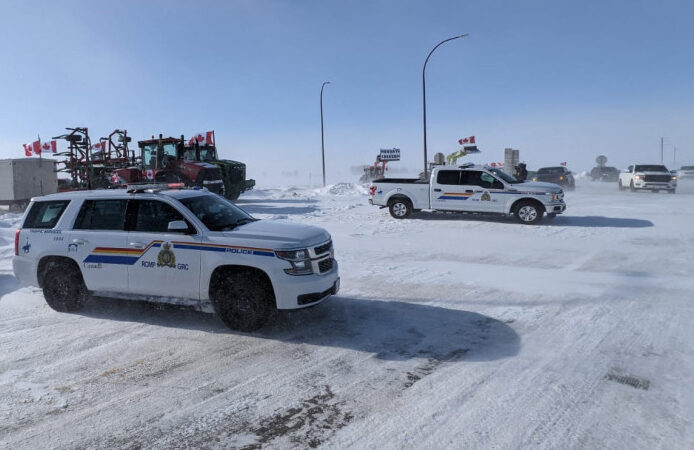Overall cross-border truck traffic plunged in early February as a series of border blockades emerged in the fight against pandemic-related restrictions.
While the number of truck drivers was relatively flat in the first two weeks of the month — with just under 99,000 truck drivers crossing the Canada-U.S. border each week — that was down from more than 106,000 truck drivers who made the journey from Jan. 24-30. It was also down from more than 110,000 who crossed the border during each of those three weeks in 2021.
From Feb. 7-13, Canada Border Services Agency (CBSA) counted 98,879 truck drivers, down from 110,088 during the same week in 2021, and 109,745 in 2020. Those totals were essentially unchanged compared to Jan. 31-Feb. 6, which saw 98,703 truck drivers in 2022; 110,278 in 2021; and 109,237 in 2020.
Border blockade costs
Protesters blocked the Ambassador Bridge in Windsor, Ont., from Feb 5-13, disrupting $390 million in daily trade and causing several automakers to pause production because of limited parts inventories. Police broke up that blockade after Ontario declared a state of emergency and a court injunction was issued Feb. 11.
Another blockade in Coutts, Alta., ran Jan. 29-Feb. 14, and ended shortly after RCMP seized multiple weapons and body armor from one group of protesters. That sweep led to 11 arrests, while another two protesters were arrested after a truck accelerated into a police check stop north of Milk River, swerving at the last minute.
A blockade in Emerson, Man., lasted from Feb. 10-16, but came down without arrests. That crossing typically sees $73 million in trade per day.
The Pacific Highway border crossing in Surrey, B.C., saw its second blockade in as many weeks this past weekend, while short-term protests have also appeared in Sarnia and Fort Erie, Ont.
In a press briefing on Feb. 17, Public Safety Minister Marco Mendicino said protesters have cost the Canadian economy billions of dollars.
Truck driver vaccine mandate
Emerson had been home to some of the first protests that emerged after Canada began to impose a vaccine mandate on border-crossing truck drivers as of Jan. 15. That rule was mirrored a week later by the U.S.
The so-called Freedom Convoy that converged on Ottawa, occupying the nation’s capital for three weeks, was initially established under the guise of fighting the vaccine mandates before expanding into demands relating pandemic-related restrictions overall.
But the vaccine mandates themselves appeared to have little effect on the numbers of truck drivers who crossed the border.
The 106,274 truck drivers who were processed Jan. 24-30 was up from 97,321 the previous week.
While fewer truck drivers crossed the Canada-U.S. border in the week after Canada’s new vaccine mandate was imposed, the drop was in line with a general reduction in overall traffic.
Source


